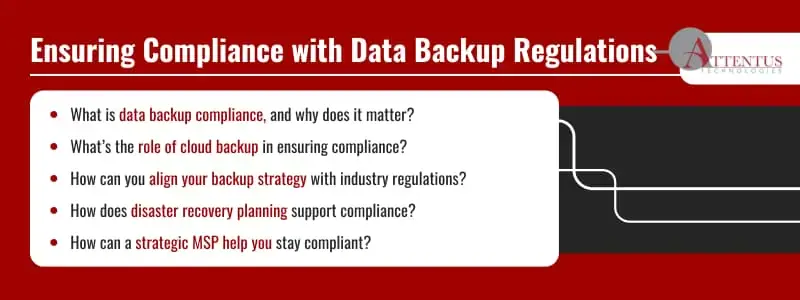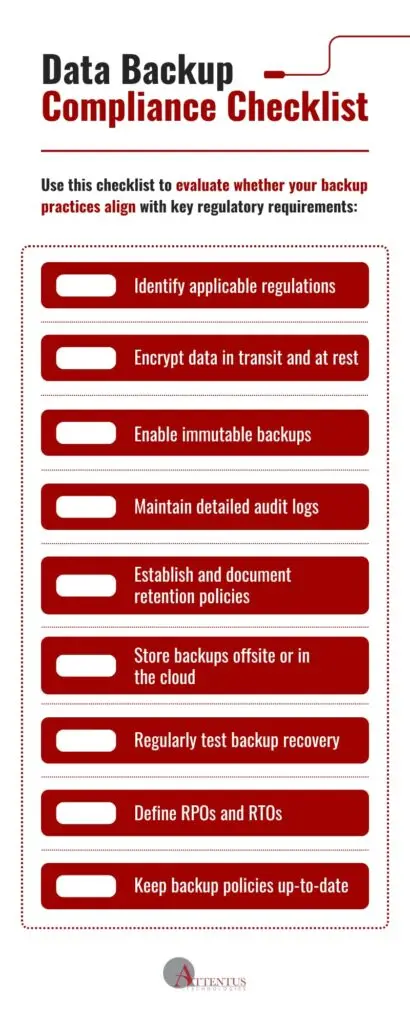Data backup compliance involves more than generic data storage. Discover how to protect your business from compliance risk.
Did you know that data breaches now cost businesses $4.88 million on average, according to IBM? That’s nearly 5 million reasons to elevate your data security and backup compliance posture.
As we go deeper into 2025, there’s mounting pressure on small and mid-sized businesses (SMBs) to meet industry data regulations that keep changing. You need a well-thought-out and executed data backup compliance strategy to mitigate risks and meet legal obligations.
Here’s what you need to know to get started.
What Is Data Backup Compliance and Why Does It Matter?
You store redundant copies of your data, but are you optimizing compliance?
Data backup compliance is more than generic data storage. You must manage your backups within applicable regulatory frameworks to ensure information is protected, recoverable, and handled responsibly throughout its lifecycle.
Prominent legal and regulatory drivers of data backup compliance include:
- The Health Insurance Portability and Accountability Act (HIPAA)
- System and Organization Controls 2 (SOC 2)
- General Data Protection Regulation (GDPR)
- Cybersecurity Maturity Model Certification (CMMC)
These require businesses to maintain multiple copies of data (including in an off-site location), encrypt backups at all times, limit access to authorized personnel, and retain backup-related documentation for specific periods.
Regular testing of backup recoverability and documented backup policies is also mandatory.
Failure to comply attracts fines, lawsuits, and perhaps most devastatingly, the erosion of stakeholder trust.
The Role of Cloud Backup in Achieving Compliance
Forward-thinking SMBs have shifted to the cloud as regulations become more stringent. This move is meant to address compliance challenges and reduce their teams’ administrative burden. And it’s paying off.
Best-in-class cloud backup solutions use robust encryption to protect sensitive information from prying eyes throughout its lifecycle. They typically have solid version control capabilities that maintain historical records of data changes and allow you to easily revert to an earlier state in case of accidental deletions or corruption.
These solutions also have sophisticated access logging that provides detailed audit trails of who accessed which information and when.
Beyond security features, cloud solutions also allow you to:
- Automate backup schedules to eliminate the risk of human error.
- Establish geographic redundancy to protect against local disasters.
- Store data off-site as a defense against ransomware and other threats that might compromise on-premises systems.
Aligning Your Backup Strategy with Industry Data Regulations
Which regulations apply to your business? Answering this question helps you understand exactly what’s needed for compliance.
Here are a few quick examples:
- HIPAA is for healthcare institutions
- GDPR is for companies serving customers in the European Union
- CMMC is for contractors working with the U.S. Department of Defense
- PCI-DSS is for eCommerce businesses that process payment card information
The must-have features for compliance typically include:
- Immutable backups for protection against tampering or unauthorized deletion.
- Audit logs of all backup operations, restoration activities, configuration changes, and access attempts.
- Encrypted transmission and storage throughout the backup’s lifecycle.
- Granular recovery options for restoring specific files, database records, or application components without disrupting entire systems.
Retention requirements may vary, though, so it’s important to know which ones apply to your business. HIPAA mandates that healthcare organizations retain data for at least six years, for example.
PCI-DSS stipulates a one-year retention period for transaction logs and restricts how payment card information can be stored in backup systems. GDPR requires businesses to retain data no longer than necessary to serve its intended purpose.
Disaster Recovery and Compliance Go Hand-in-Hand
What use is your backup if you can’t effectively and efficiently restore when needed?
48% of businesses have lost their data in the last two years because they didn’t have a comprehensive data recovery plan, according to Forbes.
This means they couldn’t meet their compliance obligations. Failing to proactively ensure available and resilient backups also inadvertently puts their business at risk. For context, 43% of companies shut down after losing critical data, according to BusinessDasher.
How quickly can operations be restored after an event? Regulatory frameworks increasingly require businesses to specify:
- Recovery point objectives (RPOs)
- Recovery time objectives (RTOs)
- Acceptable parameters for system availability and data loss.
Including these metrics in disaster recovery planning is essential. Robust documentation and response protocols are equally important. They ensure you have a well-defined playbook for managing backup failures, data corruption incidents, and other events, plus help you pass every audit with flying colours.
Regular testing of these protocols, including simulated recovery operations, provides evidence of operational readiness while identifying improvement opportunities before actual crises occur.
How a Strategic MSP Helps You Stay Compliant
Data backup compliance can seem daunting. But it doesn’t have to be. A strategic partnership with a reliable managed services provider (MSP) can help simplify compliance.
These professionals provide specialized backup management services that set you up for compliance success from day one:
- They help you configure systems to comprehensively address applicable requirements.
- This includes setting up encryption, access controls, backup monitoring, and automation.
- They deliver updates as regulatory frameworks evolve, sparing you from the burden of constant compliance research.
- Support during audits and incidents is also assured.
Most importantly, a forward-thinking MSP aligns I.T. strategy with security imperatives and legal obligations. They help you make more informed decisions regarding resource allocation, risk management, and overall technology investments.
Compliance Isn’t Optional, But It Doesn’t Have to Be Hard
Data backup compliance protects your data and your business, helping build resilience. It ensures you remain in good standing with regulators and avoid fines while acting as a proactive strategy to minimize the impact of a data breach or other future eventuality.
Take a moment to review requirements and assess gaps in your current setup:
- How does your backup solution stack up against regulatory standards?
- Are your backups immutable?
- Is there robust encryption and logging?
- Can you confidently restore backups if an incident occurs today?
- How fast?
Proactiveness is the watchword.
Remember, compliance doesn’t have to be an uphill task, and you don’t have to go it alone. Attentus Technologies is at your service if you need a hand. We help evolve your compliance posture and keep it relevant as new regulations or requirements come up. As part of our core value to seek constant improvement, we’re always looking for ways to make compliance simpler and more effective for your business.
We also help you strategize for the future with our vCIO service, offering proactive guidance that aligns your technology roadmap with your business goals. And with our fixed-price billing model, you only pay for what you need, with no surprises.
Connect with us for a compliance review or backup strategy session today.


